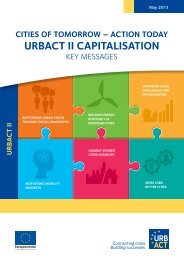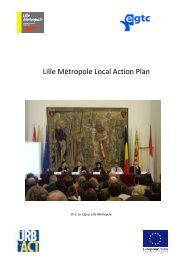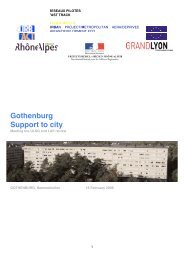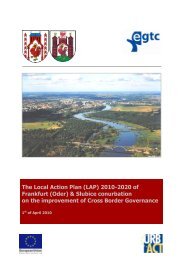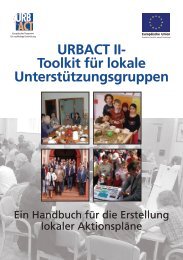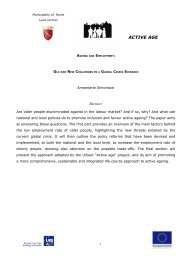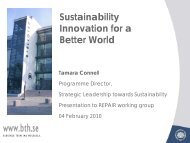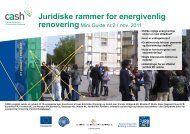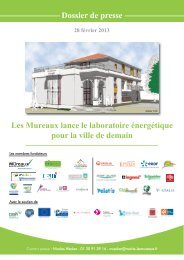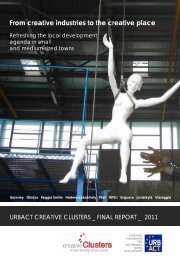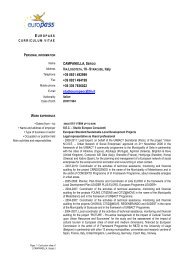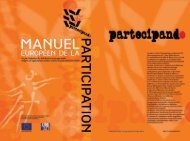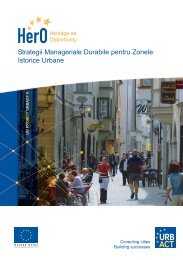ENTER.HUB_Baseline study PDF, 6 Mo - Urbact
ENTER.HUB_Baseline study PDF, 6 Mo - Urbact
ENTER.HUB_Baseline study PDF, 6 Mo - Urbact
You also want an ePaper? Increase the reach of your titles
YUMPU automatically turns print PDFs into web optimized ePapers that Google loves.
EUROPEAN<br />
UNION<br />
European Regional<br />
Development Fund<br />
3.234 Partners common challenges, according to cross cutting themes<br />
Description of the 5 STRATEGIC AND TRANSVERSAL POLICIES<br />
(transversal macro-themes)<br />
Q<br />
A<br />
Q<br />
A<br />
Q<br />
A<br />
HOW TO MANAGE URBAN DEVELOPMENT IN THE CONTEXT OF THE ECONOMIC AND FINANCIAL CRISIS:<br />
TO PUT URBAN DEVELOPMENT AT THE BASIS OF THE ECONOMIC CRISIS CHALLENGE. Urban development<br />
is essential in helping cities facing the economic and financial crisis. At the same time, due to<br />
decreased public resources, in this moment of crisis it is more and more difficult to carry on measures<br />
and concrete actions of urban development.<br />
To work at a EU level should help to optimize the resources of each city itself and of each city as a<br />
part of a whole and wider system.<br />
Urban development should not aim, especially in this critical phase, at large and expensive<br />
interventions, but at smaller, smarter, benefitting from these interventions (interventions not only to<br />
be intended as “hard” interventions, i.e. public spaces and structures requalification or construction,<br />
transport facilities, etc, but even as “soft” interventions, i.e. cultural initiatives, networks of figures<br />
interested in the same fields, etc.<br />
These two levels of interventions really need a EU exchange to be effective for a smart, sustainable<br />
and cohesive growth of cities (and of Europe, as cities are its development engines). This in line with<br />
the definition of future EU guidelines fro sustainable and smart development of cities as stated in<br />
commission’s documents<br />
HOW TO FOSTER INTEGRATED AND SUSTAINABLE APPROACHES TO URBAN DEVELOPMENT<br />
TO USE INTEGRATED (INTER-DISCIPLINARY AND MULTI-LEVEL) APPROACHES TO THE URBAN<br />
DEVELOPMENT.<br />
People who will have a “role” in a well-defined urban context (institutional, scientific, as user, as<br />
stakeholder) are those people who have to be involved in the planning and decision phases.<br />
A multi-level and multi-disciplinary (or, if we can say it, inter-level and inter-disciplinary) approach,<br />
where not only knowledge/skills/fields/levels competence, but even needs and expectations, worries<br />
and challenges are integrated, permits to provide” urban answers” shaped following everyone’s<br />
measures, and needs smart, sustainable and cohesive approaches (even because shared approaches)<br />
for smart, sustainable and cohesive growth, for smart, sustainable and cohesive cities and territories.<br />
URBACT resources will allow the city partners to create new meaningful connections and dialogue<br />
between city stakeholders to make the most and best of their railway hubs. The initial phase will<br />
include a stakeholder’s identification and analysis- shared across cities- so that they get new ideas<br />
from each other-, to bring together in an innovative way all those who can input and benefit from<br />
the station developments<br />
. HOW TO DEVELOP EFFICIENT PARTNERSHIPS AND MULTI-LEVEL GOVERNANCE PROCESSES<br />
MULTI-LEVEL GOVERNANCE FOR MULTI-SCALAR PHENOMENA.<br />
Multi-level governance, able to link different levels of authorities, each one with its own competences<br />
and fields of investigation and intervention, is an essential tool for analyzing and facing some “multiscalar”<br />
phenomena (i.e. phenomena which need to be considered at different scales because at each<br />
scale they have different manifestations and different answers to be found).<br />
For <strong>ENTER</strong>.<strong>HUB</strong> a multi-level governance would be able to individuate each hub catchment area and to<br />
intervene on it, with innovative and proper tools, being cross-wide tools to all the municipalities<br />
belonging to the catchment area itself.<br />
84<br />
<strong>ENTER</strong>.<strong>HUB</strong> <strong>Baseline</strong> <strong>study</strong> 2012.10.31



